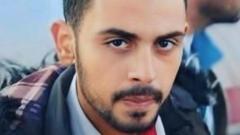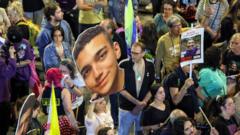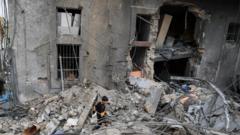A recent incident in Gaza has turned the celebration of Eid into a somber occasion for Umm Mohammed, who mourns her son, paramedic Rifaat Radwan, alongside the 14 other emergency workers killed during an Israeli military operation. As the humanitarian crisis escalates in the region, video evidence emerges challenging official narratives, highlighting the desperate need for accountability and protection for medical personnel in conflict zones.
Mother's Heartbreak: Gaza Medic Killed Amid Conflict

Mother's Heartbreak: Gaza Medic Killed Amid Conflict
A mother's poignant account of losing her son, a Gaza medic, reflects the deep personal tragedies caused by ongoing violence.
Rifaat Radwan, just 23, was part of a Palestinian Red Crescent Society ambulance convoy in Rafah when it was allegedly targeted by Israeli troops on March 23. His mother, Umm Mohammed, recalls the shock of learning he had died, especially since the area was classified as "green," indicating safety for ambulances. The Israeli military initially claimed the convoy posed a threat due to approaching without emergency lights; however, footage recovered from Rifaat's cell phone indicated otherwise.
In a heartfelt message captured before his death, Rifaat expressed his commitment to humanitarian work, a calling he took on after violence escalated in the region post-October 2023 conflict. On the day of the fatal shooting, he was responding to reports of casualties from an airstrike when his life was tragically cut short. Instead of a joyous Eid al-Fitr celebration, Umm Mohammed faced the harrowing task of recovering her son's body.
The situation drew critical attention when an Israeli official revised the military's account following the emergence of the video evidence. Claims were made that some medics may have been perceived as threats, referring to them as potential Hamas operatives without substantiated proof. This prompted the Palestinian Red Crescent to call for an independent investigation, labeling the incident as a potential war crime and a pattern of deliberate targeting of medical personnel.
Also speaking out is Munther Abed, a fellow paramedic who survived the attack, recounting the trauma of losing his colleagues and the difficulties he faced during interrogations that followed. As international agencies, including the UN, scramble to address these escalating humanitarian crises, the demand for justice for the slain medics becomes increasingly urgent.
With the casualty toll in Gaza exceeding 50,000 since the conflict reignited, the narrative surrounding the protection of healthcare workers remains a fragile and crucial aspect of the discussion. The Israeli Defense Forces have promised a thorough investigation into the killings of the paramedics, but skepticism remains among humanitarian organizations advocating for accountability and safety for medical staff in war zones.
In a heartfelt message captured before his death, Rifaat expressed his commitment to humanitarian work, a calling he took on after violence escalated in the region post-October 2023 conflict. On the day of the fatal shooting, he was responding to reports of casualties from an airstrike when his life was tragically cut short. Instead of a joyous Eid al-Fitr celebration, Umm Mohammed faced the harrowing task of recovering her son's body.
The situation drew critical attention when an Israeli official revised the military's account following the emergence of the video evidence. Claims were made that some medics may have been perceived as threats, referring to them as potential Hamas operatives without substantiated proof. This prompted the Palestinian Red Crescent to call for an independent investigation, labeling the incident as a potential war crime and a pattern of deliberate targeting of medical personnel.
Also speaking out is Munther Abed, a fellow paramedic who survived the attack, recounting the trauma of losing his colleagues and the difficulties he faced during interrogations that followed. As international agencies, including the UN, scramble to address these escalating humanitarian crises, the demand for justice for the slain medics becomes increasingly urgent.
With the casualty toll in Gaza exceeding 50,000 since the conflict reignited, the narrative surrounding the protection of healthcare workers remains a fragile and crucial aspect of the discussion. The Israeli Defense Forces have promised a thorough investigation into the killings of the paramedics, but skepticism remains among humanitarian organizations advocating for accountability and safety for medical staff in war zones.




















